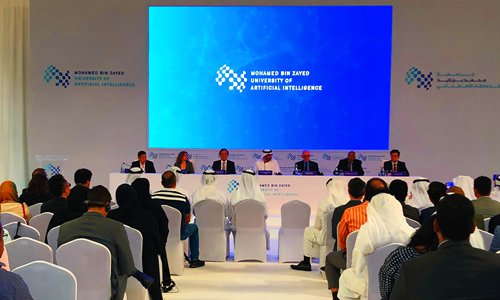
Photo: Qu Xiangyu/People's Daily
This year marks a significant milestone in artificial intelligence (AI) for both China and the United Arab Emirates (UAE). The Beijing AI Principles released earlier this year call for the "realization of beneficial AI for humankind and nature." I wholeheartedly share this goal. Now we have moved closer to achieving this, with Abu Dhabi's announcement of the Wednesday launch of the world's first graduate level, research-based AI university - the Mohamed bin Zayed University of Artificial Intelligence (MBZUAI).
AI is becoming increasingly common in our everyday lives. From AI-powered smartphones to customer service chatbots, this technology has already made our world faster, smarter, and more efficient. Given the transformative potential of AI, it's safe to say that this is just the beginning.
Experts predict that AI could contribute up to $16 trillion to the global economy by 2030. Studies estimate that AI could have contributed nearly 14 percent of the UAE's GDP - the largest share of any country in the Middle East. Given the size of China and its innovative spirit, it is not surprising that the same studies estimate the contribution of AI to China's national GDP to rise to 26.1 percent. In fact, that would be the largest share of any country, or indeed region, in the world.
Beyond economic contributions and increased convenience in our everyday lives, AI has the potential to help us address some of the world's biggest challenges. Take the damage due to climate change as an example: China has taken huge strides to reduce carbon emissions, and Beijing's air quality is now improving thanks in part to AI. The UAE is deploying AI to increase afforestation rates and contribute to an improved environment. Both China and the UAE are also actively exploring ways of using AI to address global health care issues.
Developing the best tools to leverage AI requires the very best craftsmen and women. However, there is a global shortage of AI expertise. Most national AI strategies take into account the need to develop new skills, at scale, and quickly. The next generation, excited by the new technologies and eager for the opportunities it will afford, needs to be equipped. Of course, China recognizes this, and we applaud initiatives such as Guangzhou's plans to pilot AI teaching in selected schools.
As a global community, we must concentrate efforts toward developing talented individuals who have the technical skills to unleash the full potential of AI and understand how to deploy it responsibly.
That's why the UAE and Abu Dhabi recently announced the establishment of the world's first graduate level, research-based AI university MBZUAI. By putting AI at the forefront of academia, MBZUAI will bring together expertise from around the world. The university will equip and empower students, businesses, and governments to advance artificial intelligence as a global force for positive progress.
Global cooperation and knowledge sharing will be at the core of MBZUAI. That is already reflected in the university's Board of Trustees, which I have the honor of chairing, and which includes several prominent Chinese industry leaders. Andrew Chi-Chih Yao, dean of the Institute for Interdisciplinary Information Sciences at Tsinghua University serves on the university's Board of Trustees. Dr. Wan Limin, chief machine intelligence scientist at Alibaba, is a member of the university's Advisory Board.
By leveraging global expertise and developing student talent from around the world, MBZUAI will help create the AI ecosystem the world needs to ensure that we can take full advantage of this technology's potential.
The ultimate goal of MBZUAI is helping prepare the UAE and the global community for an AI-driven future, in line with our belief that AI can lead us to the greatest societal and economic transformation of our lifetime. China has tremendous national capability, but we all have much to gain from international cooperation and knowledge sharing on AI.
That's why I hope that MBZUAI becomes yet another successful example of our two great countries working together for the benefit of our people and those around the world.
The author is UAE Minister of State and Chairman of the Board of Trustees of the Mohamed bin Zayed University of Artificial Intelligence. opinion@globaltimes.com.cn
